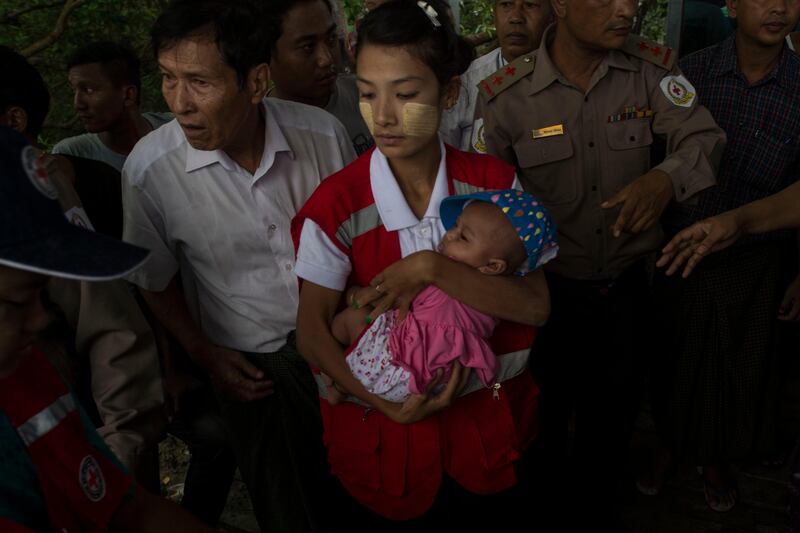More than 18,000 Rohingya have fled into Bangladesh in recent days, the International Organisation for Migration reported on Wednesday as military chiefs raised the possibility of convening a powerful council which could lead to a state of emergency being declared in the troubled Rakhine State.
Reports of more civilian injuries and fatalities continued on Wednesday amid fresh skirmishes between security forces and the Arakan Rohingya Salvation Army – deemed a terrorist group in Myanmar.
The majority of those arriving were women and children – some with bullet wounds and burn injuries, said IOM staff in Cox’s Bazar on the Bangladesh side of the border.
Ethnic Rakhine and other non-Muslim civilians from the area also continued to flee their homes in the troubled north as the situation grew more volatile.
The emerging extent of violence and destruction in Myanmar’s troubled Rakhine State prompted Britain to call for a meeting of the UN security council.
On Tuesday, Myanmar military chiefs said they would call for a meeting of the country’s powerful National Defence and Security Council (NDSC) if continued attacks threatened national security.
In fact, only the president – Aung San Suu Kyi’s proxy appointee Htin Kyaw – has the power to call together the NDSC, the country's top military and political representatives. The council has not gathered since Ms Suu Kyi became the de facto head of the government as State Counsellor in April 2016.
However, with support for the once widely reviled military running high in the wake of the recent attacks, some analysts said the move to declare a state of emergency would likely win support.
"Given popular outrage over the Arsa attacks, it may be politically expedient and administratively necessary to summon the NDSC for the first time and formally declare a state of emergency in northern Rakhine State,” said Mary Callahan, an associate professor who specialises in Myanmar politics at the Henry M Jackson School of International Studies at the University of Washington.
____________________
Read more:
Satellite pictures show Rohingya villages in Myanmar razed
Despite alleged arson attacks on Rohingya, Myanmar claims situation 'under control'
18,500 Rohingya cross into Bangladesh since fresh Myanmar fighting
____________________
However, Ms Callahan noted that declaring a state of emergency "would likely be broadly supported by the public, even among those who are not typically fans of military roles in politics and administration” who now see their country under attack by "terrorists".
On Tuesday the military claimed that Arsa had rallied more than 50 per cent of Rohingya villagers in the Buthidaung and Maungdaw – two conflict-hit Muslim majority areas close the border – and were attempting to establish a “Rohingya-only area”.
“Their [Arsa] main objective is to rally through fear, build strongholds, and declare the whole region as their liberated area,” Maj-Gen Aung Ye Win said at a Myanmar Army briefing in capital Naypyitaw for foreign military attaches and the media.
Any claims Arsa may be trying to gain an independent "Islamic territory" will only further fuel anger among Myanmar’s Buddhist majority and particularly among ethnic Rakhine who have long feared a Muslim “take-over” and loss of land to the Rohingya population.
Meanwhile, tensions between the Myanmar government and foreign aid organisations continued. More staff from international organisations were reported to be fleeing the troubled North, fearful for their safety as the government continued to post suggestions that food and materials provided by international NGOs were being used to support Arsa’s campaign.
In a move that took observers by surprise, Ms Suu Kyi’s information committee – which has been responsible for posting many of what is viewed as controversial statements and images coming from the government – dropped her official title “State Counsellor” from the name of the Facebook page it used to disseminate its messages.
While the move will allow Ms Suu Kyi to officially distance herself from international accusations that propaganda against foreigners and inflammatory statements are being made under her name, the rest of the information and style on the page remained as before – with its messages of foreign involvement in terror attacks still reaching the Myanmar public.
Concerns over abuses were also growing in other countries of the Association of South East Asian Nations (Asean) of which Myanmar is a member.
Street protests in Malaysia against the Myanmar government's treatment of the Rohingya saw more than 100 protesters, most of them reportedly Rohingya, arrested on Tuesday.
Meanwhile the chairman of the Asean Parliamentarians for Human Rights (APHR) called for member states to break with their principle of not interfering with the internal politics of other members.
“It’s time for Asean member countries to shelve the archaic non-interference policy and warn Myanmar to stop the killings,” said Malaysian lawmaker Charles Santiago, the chairman of APHR.
A boat carrying an unknown number of Rohingya capsized in the Naf River, leaving at least four dead, AFP reported on Wednesday. The boat was trying to enter Bangladesh through Shah Porir Island in the Bay of Bengal when it sank, a police official was quoted as saying.
Countless Rohingya are believed to have lost their lives attempting to flee Rakhine in recent years, with a major exodus in 2015 prompting a regional crisis as boats full of refugees were stuck at sea when Malaysia and Thailand refused to let them in.





